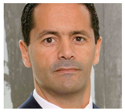Lisbon Special Report 2014: Wave of litigation
The recent collapse of Banco Espírito Santo will lead to the biggest flood of law suits in Portugal for 40 years. Does this mean things are looking up for the nation´s law firms?
It is difficult to overestimate the impact the collapse of Portugal´s second largest bank – Banco Espírito Santo (BES) – has had on the Portuguese economy. To quote Linklaters´ Portugal managing partner Pedro Siza Vieira, the bank´s demise represents the “biggest destruction of value and capital in the history of the country”.
In attempt to tidy up the mess, the country´s state bank, Bank of Portugal, has said it will spend €4.9bn recapitalising a new bank, Novo Banco, which will assume BES´ healthy assets. Meanwhile, the toxic assets will be hived off to a bad bank. This debacle will create a mountain of work for lawyers – very few of Portugal´s leading firms do not have some involvement in this mammoth restructuring job. In addition, it is anticipated that lawsuits will soon start flying around as the finger of blame is pointed. Consequently, the nation´s lawyers are bracing themselves for the biggest wave of litigation since the aftermath of the revolution in the 1970s.
While BES dominates the headlines, the fact that the Portuguese economy is enjoying something of a revival. Transactional work is on the increase as investors look to pick up assets at competitive prices. However, it should be pointed out that the countries of Lusophone Africa still offer the greatest potential for law firm growth. The fees that can be earned by lawyers in Angola and Mozambique are twice what they are in Portugal. It should be noted though that some lawyers are anticipating moderate increases in legal fees in the Portuguese market. While an increase fees is one thing, actually getting those fees paid is another. Lawyers say that getting paid is one of the biggest challenges they face, particularly since the onset of the financial crisis.
The good news is that deals are on the rise. “We´re happy to see transactional activity back in earnest,” says Linklaters´ Vieira. “We were in a depressed market but now there is an abundance of liquidity.” He adds that there are now new hedge funds and private equity funds showing an interest in Portugal, particularly in the financial services, insurance and real estate sectors. There is a feeling in the market that such investors are turning to Portugal because assets in Spain are becoming more expensive.
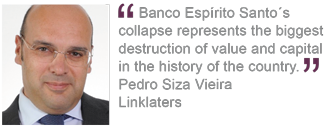 Fees on the rise
Fees on the rise
Duarte Garin, head of Uría Menéndez´s Lisbon office, says that although the fundamentals of the Portuguese economy have improved they have not changed that dramatically. Though he adds investors are showing a greater interest in the country´s assets. “In some cases, we see several bidders for certain assets and we find ourselves having to reject requests for assistance due to client conflict,” he adds. Some lawyers argue that the increase in transactional work is having little impact on fees. However, Garin says: “Fees are picking up due to an abundance of work; the number of transactions involving international investors has had a positive impact on fees.” Isabel Martínez De Salas, Garrigues´ Portugal managing partner says that she expects growth this year, both in revenue and profits.
Manuel Santos Vitor, managing partner at PLMJ says “we are at the first stage of a recovery and foreign investors are coming in”.
Meanwhile, Bernardo Abreu Mota, partner at Campos Ferreira, Sá Carneiro & Associados, says there is “a gap between legal fees in Portugal and those in other jurisdictions”. Another partner remarks that fees have “hit the bottom”.
Gonçalo Anastácio, partner at SRS Advogados, says that work is “clearly picking up”. However, he adds that due to Portugal´s financial problems, court fees have risen dramatically and this has had an impact on what options are available to clients. “The risk for a client that loses a civil action has increased significantly,” he says. In some cases court fees have increased ten-fold.
Linklaters´ Vieira says there is now a different client landscape in Portugal. “Major Portuguese companies have changed hands – controlling shareholders have been forced to sell, this is an opportunity for everyone, banking activity will not go away.”
The biggest development in the Portuguese banking sector in the last year was BES’ announcement of a €3.6bn loss, which led to the development of a plan to spin BES´ healthy business off into a “good bank” and put its toxic assets in a “bad bank”. This has created a considerable amount of work for Portugal´s law firms. Uría Menéndez´s Garin says many firms are “involved in the acquisition of GES [Grupo Espírito Santo] assets”.
Long-term litigation trend
It is anticipated that there will be a significant number of lawsuits relating to the collapse of BES, with auditors, regulatory bodies and board members expected to potentially be in the firing line.
Rui Amendoeira, managing partner at Miranda Correia Amendoeira & Associados, says: “There will be lots of lawsuits filed, a number not seen since the 1970s after the revolution.” Vieira says the “incentive for litigation” relating to the bank´s failure is very strong. One managing partner predicts that the government and regulators will be on the receiving end of lawsuits.
Manuel Protásio, partner at Vieira de Almeida & Associados, echoes this view. “Litigation will be a long-term trend with regard to legal work in Portugal,” he says. However, while the demise of BES has created many opportunities for law firms, Abreu Mota says that it should be remembered that this is not the same as new investment in the economy.
One partner at a Lisbon-based firm says the BES crisis illustrates that there is a “serious corruption problem in Portugal”. The partner adds that more compliance is needed and that the banks should be subjected to greater EU scrutiny. “Banking regulation is fundamental, because there is blatant corruption,” the partner says.
Sérvulo & Associados managing partner Paulo Câmara says the consequences of the collapse of BES will reach the entire economy and, as a result, there will be opportunities for new foreign investors into the Portuguese market.
Carlos Aguiar, senior partner at Carlos Aguiar, Ferreira de Lima & Associados, agrees that opportunities for lawyers will be created by the “fire sale” of BES´ assets and the associated potential civil and criminal litigation. In addition to BES-related work, Esquível Advogados partner José Luís Esquível says the biggest opportunities for law firms will “arise from privatizations and new public concessions, namely on urban transport and ports”.
Miguel Castro Pereira, managing partner at Abreu Advogados, says that, while investors regained appetite for the Portuguese real estate and M&A markets, Portuguese exports have grown in a “sustained manner”, mostly in Portuguese-speaking countries, notably Angola and Mozambique. He adds: “Law firms also moved abroad, to these countries, searching a solid local stance through associations with native law firms.”
Nelson Raposo Bernardo, managing partner at Raposo Bernardo says there is generally more work available for law firms in Portugal, particularly in M&A, regulation, private equity, real estate, foreign investment and tax. However, he adds that there is also still a high volume of work in the areas of litigation, arbitration, labour and restructuring. Meanwhile, Raposo Bernardo also says there has been a considerable increase in statutory audit/due diligence work.
It is anticipated that the deleveraging of the Portuguese economy will generate significant work for law firms in the coming years and that demand for legal services will increase. Some lawyers argue that this will not result in law firms expanding as they will be much more cautious with regard to increasing lawyer numbers, although others in the market argue that firms in Portugal will be aiming to boost their numbers as work picks up.
Are Portuguese law firms as concerned about the advance of the legal arms of the “Big Four” auditors (PwC, KPMG, Deloitte and EY) as their peers in Spain?
“The auditors will become an issue,” says one managing partner. “Though the government is not supporting it [the idea of multidisciplinary firms].” Indeed, earlier this year, the Portuguese justice minister Paula Teixeira da Cruz said that the creation of multidisciplinary firms of lawyers, auditors and consultants would be “not admissible” under revised rules for the Portuguese Bar. One managing partner says that the market “does not like having legal and auditing services within the same firm”.
Garin says that it is difficult for law firms to develop new ways of working. “Fifteen years ago law firms were lagging behind in many aspects, now they are very efficient, I don´t know many other ways in which we can innovate,” he says. Vieira adds that law firms have made “immense progress” in Portugal, but that they can still learn much from other professions. “Architects, consultants and engineers are much more efficient – they’ve invested more in technology,” he says.
Amendoeira acknowledges that the legal sector will be the last profession to be “automated” but argues that the level of service provision in the legal sector is better than that in other professions. “The responsiveness and client care in the legal sector is better,” he says. Meanwhile, Abreu Mota says it is important that clients understand that there is “a difference between legal services and legal advice”. He adds that clients are increasingly looking for legal advice in addition to legal services.
Cuatrecasas, Gonçalves Pereira co-managing partner Maria João Ricou says a major challenge for the firm is the development of its international strategy. She adds: “Although our main purpose is to support Portuguese clients abroad and foreign entities in the Portuguese market, we believe we can further explore our international capabilities.” Fellow co-managing partner Diogo Perestrelo says: “Legal market developments have been a continuous challenge to the leading law firms, which are asked to address clients’ needs in very competitive conditions, and offer creative solutions to deal with new issues, such as funding strategies. 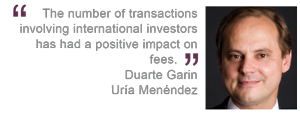
African litigation increasing
With regard to Lusophone Africa, Amendoeira says that clients are faced with practical problems, such as the repatriation of funds, which lead to disputes: “We’re now more involved in litigation – though the hourly rates may be smaller, a sizeable portion of our work is around conflicts in Angola and Mozambique – this work cannot be commoditised.”
Amendoeira adds that there are also opportunities for law firms in Francophone Africa, particularly in Gabon, Cameroon and the Congos. In order to better serve investors in Francophone Africa, the Miranda Alliance network recently opened an office in Paris through the addition of French firm Cabinet Sophie da Cunha. The areas of oil and gas and litigation and tax, in particular, are keeping firms busy in Francophone Africa, according to Amendoeira.
PLMJ’s Santos Vitor concurs with the view that there is now a lot of litigation in Lusophone Africa. “The market has developed,” he says.“There is also a lot of arbitration, though it is difficult to find a large pool of lawyers in Angola and Mozambique, it’s difficult to hire and retain people.” One managing partner says that, in Angola and Mozambique, around 70 to 80 per cent of deals over a five-year period end up in litigation as local courts affirm their jurisdiction and judges dismiss arbitration.
AVM Advogados partner Claudia Santos Cruz says there is currently a lot of debt-related work for lawyers in Angola. “The Angolan ministry of finance is going after tax debt, largely profits on oil sales.” Meanwhile, the booming economies of Angola and Mozambique are also attracting international firms, which are looking to gain a foothold in the region, according to Santos Cruz. “Firms from South Africa and the UK are trying to enter these markets – some have teams of business development people hiring lawyers when they can – good lawyers in Angola and Mozambique are much sought after.”
Câmara says the economies in Lusophone Africa are becoming increasingly sophisticated. “They are developing capital markets, such as the Angolan stock exchange, and this is transforming their financial markets.” Santos Vitor adds that the economies in Lusophone Africa are growing faster than the Portuguese economy. According to one partner at a Lisbon-based firm, some firms are pulling out of pitches in Portugal because the fees are “so low” in comparison to Lusophone Africa. The partner adds: “You can earn twice the hourly rates in Angola that you earn in Portugal.”
Client loyalty undermined
One partner says that clients successfully used the economic crisis to procure legal services on terms that were favourable to them. “Clients had budget pressures, and they had to reduce costs,” he says. “The restructuring of Portuguese corporations has undermined client loyalty. It is now unusual for a client to be loyal to one firm.” Meanwhile, Anastácio says that, as a result of the crisis, a number of corporates become more reluctant to use existing fee structures for different types of work which meant there had to me more “innovation in the field of pricing”.
Vieira says clients have become more vocal and clear in delivering messages if they are dissatisfied. “They are more intolerant of what they perceive to be failures of service.” He adds that it is increasingly the case that in-house counsel are getting involved in selecting external counsel.
Anastácio says that, in the most “strategic areas of law”, it is often company boards that select external law firms, but the increasing use of panels of law firms is empowering general counsel in this respect.
One managing partner admits it can be a challenge to keep associates in law firms happy. “You have to keep motivating them, because [since the crisis] there is less opportunity for them to make partner.” Vieira sums it up: “No growth is a tough model”.
Anastácio says there are now more partners as a percentage of fee earners in firms. He adds: “Our top firms are more senior and have more specialised structures than 10 or 20 years ago in Portugal. However, curiously now is a good time for those finishing university as a lot of trainees are being hired. We’re now also seeing an increasing number of lateral hires.”
Câmara says firms now have more demanding young lawyers: “They want to progress more quickly in their careers.”
However, Garin argues that all of the leading Portuguese firms have successfully taken the “generation leap”. One managing partner, however, warns: “The strength of the junior partners [in the leading Portuguese firms] is still not at the level of the senior partners.”
Vieiri says that in a “no-growth market” it is a challenge to retain the best of the new generation of lawyers. “If the market is not growing, the older people in law firms will have to leave,” he says.
One managing partner says all partners in firms should be nurtured with a view to them possibly leading the firm one day in the future. “You should not concentrate on just one or two partners. All partners need to know they could be potential future leaders.”
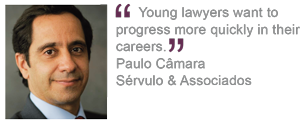 Doubts about recovery
Doubts about recovery
Anastácio says that the Portuguese legal market has reached a turning point and law firms are busier. He adds that, with regard to the law firm model, “one size does not fit all, there is room for the retailers and niche models [as well as larger firms]”. However, Amendoeira doubts the Portuguese economy has turned the corner. “It’s an uncertain world, is there another bubble in the US stock market? I’m not sure we’re at a turning point, but we [law firms] are better prepared – we are leaner and more efficient operations,” he says.
ABBC & Associados managing partner Benjamim Mendes says the turmoil in the Portuguese financial sector is creating conflicts of interest that has brought a new dynamic to the market. “Clients are re-evaluating the appointment of their external legal advisers, depending on the conflicts that may arise. Clients are more sensitive to these conflict situations which gives new opportunities to other players,” he says.
Tiago Caiado Guerreiro, a lawyer at Caiado Guerreiro & Associados, says the consequences of the financial crisis have created a number of challenges for law firms. He says that fixed fees and “all-inclusive budgets” are more common than a few years ago and that “getting paid is actually one of the biggest challenges in the current European crisis context”.
Pedro Pinto, Bessa Monteiro, Reis, Branco, Alexandre Jardim & Associados – Sociedade de Advogados (pbbr) partner Pedro Pinto says clients increasingly try to exercise greater control over partners at every stage, though he adds, on the positive side, there is increasing demand for legal services in the real estate, TMT, corporate and M&A sectors.
Firms lower fees to “ridiculous” levels
João de Macedo Vitorino, managing partner at Macedo Vitorino & Associados, observes that clients are “requesting more and more capacity to provide services outside Portugal at a level – fees included – compatible with their Portuguese experience”. Meanwhile, Sérvulo & Associados´ Câmara says that having experienced the crisis in partnership with clients “ties of loyalty [with clients] have been tried and strengthened”. He adds: “Where our clientele has expanded, there is an increase in the scrutiny of the legal services we provide.”
Alves Pereira & Teixeira de Sousa senior partner José Alves Pereira says clients are making stringent demands with regard to“speed of answer and professionalism of performance”. He adds that the challenge for large firms is to attract sufficient business to enable them to maintain their current size, while smaller firms face the challenge of accepting clients that are used to dealing with larger firms and therefore need to provide the “same speed and quality of advice”. Meanwhile, CCA Ontier founding partner Carlos Cruz says the crisis has made clients more aware of compliance issues.
Espanha & Associados partner João Espanha says it is remarkable how Portuguese law firms were able in recent years to “shoot themselves in the foot” by lowering their fees to levels which are “sometimes ridiculous”. He adds that this decision to lower fees in such a way has increased competition and left the legal sector with a “huge price to pay for many years to come”.
The is some optimism though. Vitor Marques da Cruz, partner at Marques da Cruz e Associados, says Lisbon is “facing a post-crisis revival”. He adds: “Things have been changing, new companies such as restaurants, start-ups, hostels, tour services and offices can be found in Lisbon. Many rebuilding plans were approved recently and the city background is changing.” He adds that there is new housing and shops in the city and more such developments are planned. 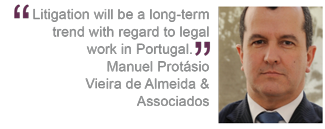
Pedro Vilarinho Pires, partner at Marques Mendes & Associados says there is still an emphasis on legal work relating to the restructuring of companies, “notably insolvency, revitalisation (recovery) proceedings and employment”. He adds that with regard to EU and competition law, there has been some increase in work related to “restrictive practices (notably cartels/leniency) and compliance (competition law compliance reviews or audits)”.
RFF & Associados founding partner Rogério M. Fernandes Ferreira says there were two major trends in relation to client demands in the last year. He explains: “On one hand, companies maintain the need for assistance in tax compliance matters as there have been, on several matters, namely as a way to prevent tax avoidance, an increase of reporting obligations. On the other hand, there has been an increasing demand from high net worth individuals to re-structure their assets in order to comply with applicable regulations, thus avoiding any future additional assessments.”
Pedro Guimarães, partner at F. Castelo Branco & Associados, says: “Clients want their legal advisers to help them in a practical way – they want advice on how they intend to go about what they intend to do. Clients are also more demanding with regard to transparency – they want more clarity on fees and how fees are incurred. But often it´s difficult to say how much work will cost in advance.”
Vieira de Almeida & Associados´ Protásio says that, while the Portuguese economy is not booming, he has reasons to feel encouraged. “Discounted assets are attracting foreign investors and the legal industry should be optimistic,” he says. Santos Vitor says that, in the language of the ratings agencies, the Portuguese legal market is “stable with a positive outlook”. He adds: “Fees, together with business, are picking up a little bit, though there is no dramatic change.”
Garin believes there is optimism because although there is still uncertainty as to what is lying ahead, firms have shown that they are “capable of weathering heavy storms”. Vieira concludes that, though the world is unstable, the European economy will deleverage and the “bid-buy spread will close”. He adds: “Deals will be done and, in a complex situation, clients need assistance.”
With deals on the increase and a wave of litigation set to hit Portugal, the nation´s lawyers will not be short of work in the year ahead. However, with the increase in clients, there will come greater demands on lawyers, who will be subjected to greater scrutiny of their services; a trend that will foster greater efficiency and innovation in the profession. With margins remaining tight in Portugal, Lusophone Africa will continue to provide the best growth opportunities for Portuguese firms.









